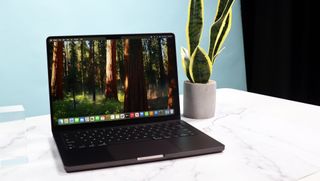If you’ve bought an M4 MacBook Pro and get the feeling its display looks even better than it did on previous models, you’d be right. Apple has kept very quiet about it, but there seems to be a new technology at work inside the laptop’s screen, and it could be providing a handful of worthwhile benefits.
The discovery was made by well-known display industry expert Ross Young, who has a strong track record when it comes to Apple leaks and rumors. Posting on X, Young said that the new MacBook Pro is using quantum dot tech that is “very efficient” and provides “as good or better color gamut and better motion performance” compared to the previous technology used in MacBook displays.
Despite this performance increase, Apple didn’t mention the quantum dot upgrade when it revealed the M4 MacBook Pro in October. However, there was one clue that something might have changed: the maximum screen brightness for SDR content was increased from 600 nits all the way up to 1,000 nits – a significant improvement.
In our 14-inch M4 MacBook Pro review, we described the display as “gorgeous” and noted that its increased SDR brightness made it “quite effective at remaining viewable and usable in direct sunlight.” At the time, though, we had no idea about Apple’s quantum dot treatment, which has remained well hidden until now.
Getting the green light

Back in 2015, Apple said that it considered quantum dot technology for its screens, but ultimately rejected it because it involved using the toxic element cadmium. Apple has long made environmentalism a key part of its product strategy, and that likely wouldn’t have jived with the inclusion of a harmful element in the display.
However, the new quantum dot tech used in the M4 MacBook Pro can be achieved without the use of cadmium, Young explains. This, alongside its improved efficiency, presumably gave it the green light from Apple, allowing the company to enhance its MacBook Pro displays without the environmental concerns.
The next question is whether quantum dot screens will make their way to other devices. Apple sometimes shares technology between the MacBook Pro and the iPad Pro, so it’s possible that Apple’s flagship tablet might follow its laptop in the future.
Whether Apple will actually go ahead with this move – or bring quantum dot panels to some of its other products – remains to be seen.